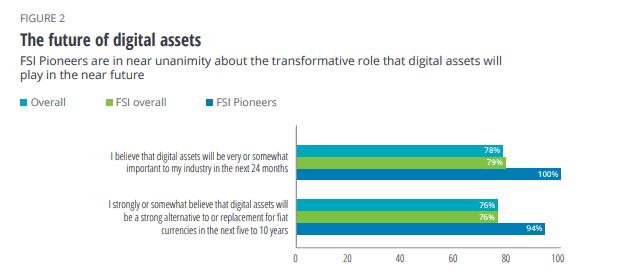The latest survey carried out by Deloitte indicates that traditional banks and financial institutions must prepare for the massive adoption of cryptocurrencies, which will dominate the entire financial system in the next 10 years.
Deloitte, a prestigious global audit, consulting and advisory firm, applied its fourth annual survey «Global Blockchain Survey», which reveals interesting data about the current and future direction of new technologies, such as blockchain and the cryptocurrencies. “Global Blockchain Survey” was addressed to 1,280 high-level executives and professionals from the financial services industry (FSI) located in 10 countries around the world, such as: Brazil, mainland China and the administrative region of Hong Kong, Japan, Singapore, Germany , South Africa, the United Arab Emirates, the United Kingdom and the United States.
The results of this survey show that banks and traditional financial institutions must prepare, today, to embrace an inevitable digital future. The company indicated that 73% of those surveyed believe that if banks do not choose to innovate and optimize their financial services with technologies such as blockchain, distributed ledger technology (DLT), among others, then they will lose their competitive advantage over companies. that if they offer services based on these technological innovations.
For the audit and advisory company, the emergence of cryptocurrencies and digital assets is accelerating the transformation of the financial industry and replacing traditional practices with more efficient, secure and transparent methodologies. Cryptocurrencies and blockchain are breaking new ground in the finance sector and their innovative products are driving economic growth globally, Deloitte said.
It may interest you: Cryptocurrencies, the driving force of emerging economies in Latin America and the world
Blockchain, a scalable and reliable technology
The results of the survey applied by Deloitte underline the important role that blockchain technology is playing today, as the main driver of change. Overall, 81% of those surveyed by the company consider blockchain to be a scalable technology, which has already managed to gain widespread adoption around the world.
Source: Deloitte.
96% of the survey participants with extensive knowledge of what blockchain is, say that the technology has already become widespread in the world, playing a significant role in building a more complete and open financial infrastructure. It is worth remembering that blockchain technology has also found valuable use cases in other industries, such as education, health, art, tourism, fashion and design, among many others.
On the other hand, 78% of respondents believe that cryptocurrencies and digital assets enable high-value business use cases, so it is only a matter of time to see them within their companies. 80% stated that they are discussing the integration of new solutions and projects based on blockchain technology and cryptocurrencies with their partners and clients or, failing that, they have already integrated solutions based on these disruptive technologies. Likewise, 80% of those surveyed believe that blockchain and cryptocurrencies will bring with them new sources of employment worldwide.
Cryptocurrencies and fiat money in 10 years
For 76% of the participants in the survey applied by Deloitte, cryptocurrencies and digital assets will replace the use of fiat money, the money we know today, in the next 5 to 10 years. For most, the innovation that comes with crypto assets will continue to grow and evolve, enabling much faster, more transparent and secure payments, making the use of fiat currencies redundant in the future.

Source: Deloitte.
FSI professionals point out that traditional banks and financial institutions need to start moving to offer custody and management services for cryptocurrencies and digital assets to their respective clients and users, in order to remain relevant within the financial sector in the future. The change that these new technologies are currently producing is more than notorious in payments, whose nature is undergoing a transcendental change with the implementation of digital assets.
Also, access to financial services and products is changing radically. An example of this are the DeFi, a new decentralized financial ecosystem that allows millions of people to access decentralized loans and other services without the intervention of third parties. For this reason, more than 40% of those surveyed agree that custody, new payment channels and the diversification of services and investments are some of the cases of use of cryptocurrencies with the greatest potential that entities in the system can adopt. traditional so as not to be left behind in digital innovation.
Regulation, the biggest obstacle to crypto adoption
In general, 6 out of 10 respondents agree that the lack of clear regulation has been the main obstacle to the mass adoption of cryptocurrencies and digital assets. Also, the majority pointed out that legacy infrastructure is another factor that has prevented a massive adoption of crypto assets in the world.
Respondents also expressed concern about cybersecurity risks, noting that data security and privacy is the area that requires the most attention within the industry to protect investors and users.
Linda Pawczuk, director of the Financial Services Industry (FSI) area and leader of the Deloitte FSI Blockchain group, said that cryptocurrencies have caused a significant change in the global financial ecosystem in the last year, forcing traditional entities to redefine themselves and reinvent themselves to find innovative ways to stay relevant within the finance industry. Richard Walker, director of Deloitte in the United States, pointed out that although many still consider cryptocurrencies as a rival, the reality is that this industry is creating new opportunities for banks and financial institutions to reinvent their business models and become more efficient. .
Continue reading: Grayscale Bitcoin Trust, the gateway for institutional investors to cryptocurrencies
